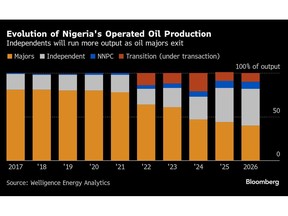Nigeria’s Oil Comeback to Test Its Commitment to OPEC+ Cuts
Africa’s biggest crude producer Nigeria has emerged from a years-long output slump due to improved security, creating a quandary for the government.
Stretched public finances badly need the extra revenue that would come from higher oil exports, but the country is also under pressure to adhere to OPEC+ production limits that have helped keep global crude prices above $70 a barrel.
Nigeria is “occupied with increasing production first to meet its budget aspiration, and then will engage with OPEC to raise the nation’s quota,” Gbenga Komolafe, chief executive officer of the Nigeria Upstream Petroleum Regulatory Commission, said in an interview.
Crude output reached 1.48 million barrels a day last month, the Nigerian Upstream Petroleum Regulatory Commission reported. That’s just a fraction below the country’s 1.5 million barrel-a-day OPEC+ output quota, and major turnaround from a low of 1.1 million barrels a day reached in 2022, when oil majors were selling assets and pipelines ran dry due to theft and vandalism.
Steps taken by the government to improve security and attract investment have reversed that trend, and the Nigerian state anticipates production reaching 2 million barrels a day, the most in a decade, although most analysts predict a more modest increase.
Nigeria owes a large part of its recovery to security initiatives put in place several years ago to deal with theft and vandalism, mainly targeting the network of pipelines that thread their way through the Niger River delta.
State-run Nigerian National Petroleum Company Ltd. has set up a production monitoring command center that tracks activity from all operators in real time, complementing measures on the ground to reduce crime and increase community engagement, according to Mansur Mohammed, head of West Africa upstream research for Wood Mackenzie Ltd.
These measures “are starting to bear fruit,” though at a significant cost, said Ifeanyi Onyegiri, a senior analyst for Welligence. Nigeria “should be able to negotiate an increased quota with OPEC if they can demonstrate they can sustain production.”
Nigeria has grappled with the problem of oil theft and vandalism for decades, so there’s reason to be cautious about whether the recent improvements will last. Until the security measures are proven throughout the Niger Delta’s vast pipeline network, average production for any given month is forecast to be around 1.4 million barrels a day, according to Pranav Joshi, an analyst at Rystad Energy A/S.
Homegrown Producers
While the recent output gain “is largely attributable to the improved security situation” there has also been a notable impact from “significant investment by operators,” said Dipo Ogunbiyi, an energy analyst at Renaissance Capital Africa.
After international companies such as Exxon Mobil Corp. and Equinor ASA sold many of their assets in the West African nation, more production has been put in the hands of companies owned and operated by Nigerians. Drilling has more than tripled in four years, said the Nigeria Upstream Petroleum Regulatory Commission’s Komolafe.
Seplat Energy Plc, formed through a merger of two companies owned by local businessmen Ambrosie Bryant Orjiako and Austin Avuru in 2009, plans to more than double its output to 120,000 barrels a day in the next six months after completing the purchase of Exxon’s onshore oil and gas assets. There is an opportunity to top 200,000 barrels a day, Chief Executive Officer Roger Brown said last month.
Oando Plc, a producer headed by Nigerian businessman Wale Tinubu that’s picked up assets from multiple oil majors, expects to boost crude production to 100,000 barrels a day from 40,000 barrels a day “over the next few years,” Alex Irune, managing director of Oando Energy Resources, said in a reply to questions.
“Nigeria has both the spare capacity and resources to achieve and even surpass, the 2 million barrels-per-day mark,” he said.
It remains to be seen whether these ambitions could cause a rupture with OPEC+. Fellow African producer Angola was forced to quit the cartel in December 2023 after rejecting tighter limits on its output. Yet six months later, the United Arab Emirates was granted a more generous quota reflecting an expansion in its productive capacity.
For Nigeria, as with several other quota-busting members of the group such as Iraq and Kazakhstan, the short-term financial benefits of higher production may have a stronger appeal than achieving perfect OPEC+ compliance.
“Given the country’s current fiscal situation, there’s a lot of incentive to produce in excess of the OPEC quota, as any incremental revenue has a direct impact on budget deficit,” Ogunbiyi said. He predicted that Nigeria will attempt to renegotiate its output limit if the capability is there.








